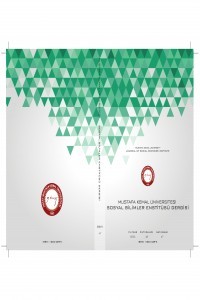Assessing Metacognitive Awareness And Learning Strategies As Positive Predictors For Success In A Distance Learning Class /Uzaktan Eğitim Sınıfında Başarının Pozitif Yordayıcısı Olarak Bilişötesi Farkındalık Stratejisi Ve Öğrenme Stratejilerinin Değerlend
Abstract The aim of this study is to investigate the effects of metacognitive awareness and learning strategies on students success in a distance learning class. The data were collected through Metacognitive Awareness Inventory (Schraw&Dennison, 1994) and Learning Strategies Questionnaire (Pintrich, P.R., Smith, D.A.F., Garcia, T. & McKeachie, W.J., 1993). The data were gathered from 126 undergaduate students. The results showed that 1. Metacognitive awareness and learning strategies has an important role on students' academic success in an online English course. 2. The subcale of metacognite awareness, evaluation strategy, was the positive predictor of academic success. 3. The subscales of MSLQ, organization and peer learning strategies were the positive predictors of academic success. Keywords: Metacognitive Awareness Strategy, Learning Strategy, Distance Learning, Academic acheivement Özet Bu çalışmanın amacı uzaktan eğitim sınıfındaki öğrencilerin başarısında bilişötesi farkındalık stratejisi ve öğrenme stratejisinin etkilerini araştırmaktır. Veriler “Metacognitive Awareness Inventory, (Schraw&Dennison, 1994) – Bilişötesi Farkındalık Envanteri- and Learning Strategies Questionnaire ( Pintrich, P.R., Smith, D.A.F., Garcia, T. & McKeachie, W.J., 1993)- Öğrenme Stratejileri Envanteri- ölçekleri kullanılarak elde edilmiştir. Veriler araştırmaya katılan 126 lisans öğrencisinden alınmıştır. Araştırma sonucunda aşağıdaki sonuçlara ulaşılmıştır. 1. Uzaktan eğitimde verilen İngilizce derslerinde bilişötesi farkındalık ve öğrenme stratejilerinin öğrenci başarısı üzerinde önemli bir rolu vardır. 2. Bilişötesi farkındalık stratejisinin alt boyutundan olan değerlendirme stratejisi akademik başarının pozitif yordayıcısıdır. 3. Öğrenme Stratejilerinin alt boyutlarından organizasyon ve akran öğrenme stratejileri öğrencinin akademik başarısının yordayıcılarıdır. Anahtar Kelimeler: Bilişötesi Farkındalık Stratejisi, Öğrenme Stratejisi, Uzaktan öğrenme Akademik Başarı
Anahtar Kelimeler:
Bilişötesi Farkındalık Stratejisi, Öğrenme Stratejisi, Uzaktan öğrenme
___
- References
- Akın, A., Abacı, R., & Çetin, B. (2007). The validity and reliability of the Turkish version of the metacognitive awareness inventory, Educational Sciences: Theory & Practice, 7(2), 671-678
- Benson, P. (2001). Teaching and researching autonomy in language learning. London: Longman.
- Borkowski, J.G. (1992). Metacognitive Thory: A framework for teaching literacy, writing and math skills, Journal of learning disabilities, 25, 4, 253-257
- Brislin R.W. (1970) Back-translation for cross-cultural research. Journal of Cross-Cultural Psychology, 1, 185–216.
- Camahalan, F.M.G. (2006) Effects of a metacognitive reading program on the reading achievement and metacognitive strategies of students with cases of dyslexia. Reading improvement.
- Cho, S. & Ahn, D. (2003). Strategy acquisition and maintenance of gifted and non-gifted young children. Council for Exceptional Children, 69(4), 497-505.
- Curry, K.J. (2006). Motivation and learning strategies of students in distance education. Journal of the Mississippi Academy of Sciences, April 1-2006
- Dunn R. 1986. Learning style: State of the science. Theory into Practice, 24(1), 10-19.
- Flavell, J.H.(1979). Metacognition and cognitive monitoring: A new area of cognitive-developmental inquiry. American Psychologyist, 34, 906-911
- Garner, R. & Alexander, P.A. (1989). Metacognition: Answered and unanswered questions, Educational Psychologist, 24, 143-158
- Hacker, D.J., Dunlosky, J., & Graesser, A.C. (1998). Metacognition in educational theory and practice. Mahwah, NJ:EarlbaumHarris, V. (2003). Adapting classroom-based strategy instruction to a distance learning context. TESL Internet Journal, 7 (20).
- Harris, V. (2003). Adapting classroom-based strategy instruction to a distance learning context. TESL Internet Journal, 7 (20).
- Joseph, N. (2010). Metacognition Needed: Teaching Middle and High School Students to Develop Strategic Learning Skills, Preventing School Failure, Volume 54, 2(2010), 99-103, Heldref Pub.
- Karadeniz, Ş., Büyüköztürk, Ş., Akgün, Ö.E., Çakmak, E.K., & Demirel, F., (2008). The Turkish adaptation study of motivated strategies for Learning questionnaıre (mslq) for 12–18 year old children: Results of confirmatory factor analysis, The Turkish Online Journal of Educational Technology – TOJET October 2008 ISSN: 1303-6521 volume 7 Issue 4 Article 12
- Kosnin, A.M. (2007). Self-regulated learning and academic achievement in Malaysian undergraduates, International Education Journal, 2007, 8(1), 221-228. http://www.eric.ed.gov/PDFS/EJ841762.pdf (Erişim Tarihi: 18.05. 2010)
- Kruger, J., and Dunning, D. (1999) Unskilled and unaware of it: How differences in recognizing one's own incompetence lead to inflated self-assessments. Journal of Personality and Social Psychology 77, 6, 1121-1134.
- LeBlanc, R. & Painchaud, G. (1985). Self-Assessment as a second language placement instrument. TESOL Quarterly, 19(4), 673-687.
- Livingstone, J.A. (1997). Metacognition: An Overview, (http://gse.buffalo.edu/fas/shuell/CEP564/Metacog.htm) (Erişim Tarihi: 19.04.2010)
- Memnun, D.S.&Akkaya, R. (2009). The levels of metacognitive awareness of primary teacher trainees, Procedia social and behavioral Sciences 1(2009), 1919-1923
- Pintrich, P. R., Smith, D. A., Garcia, T., & McKeachie, W. J. (1993). Reliability and predictive validity of the Motivated Strategies for Learning Questionnaire (MSLQ). Educational and Psychological Measurement, 53, 801-813.
- Ridley, D.S., Schutz, P.A., Glanz, R.S. & Weinstein, C.E. (1992). Self-regulated Learning: the interactive influence of metacognitive awareness and goal-setting. Journal of Experimental Education 60 (4), 293-306.
- Schraw, G. & Dennison, R.S. (1994). Assessing Metacognitive Awareness, Contemporary Educational Psychology 19, 460-475
- Simsek,A. Balaban, J.(2010) Learning Strategies of Successful and Unsuccessful University Students, Contemporary Educational Technology, 2010, 1(1), 36-45
- Smith D.M., Colb D.A. 1996. User's guide for the learning-style inventory. Boston, MA: Hay/McBer Training Resources Group.
- White, C. J. (1995). Autonomy and strategy use in distance foreign language learning. [Electronic version]. System, 23(2), 207−221.
- Zahedi, K. & Dorrimanesh, P. (2008). Metacognitive Learning Strategies and Academic Success of TEFL M.A. Students in Distance Education, International Journal of Criminology and Sociological Theory, Vol. 1, No. 2, December 2008, 161-176.
- Zimmerman, B.J.&Pons, M.M. (1986). Development of a structured interview of assessing student use of self-regulated learning strategies. American Educational Research Journal, 23, 614-628.
- Başlangıç: 2004
- Yayıncı: Hatay Mustafa Kemal Üniversitesi
